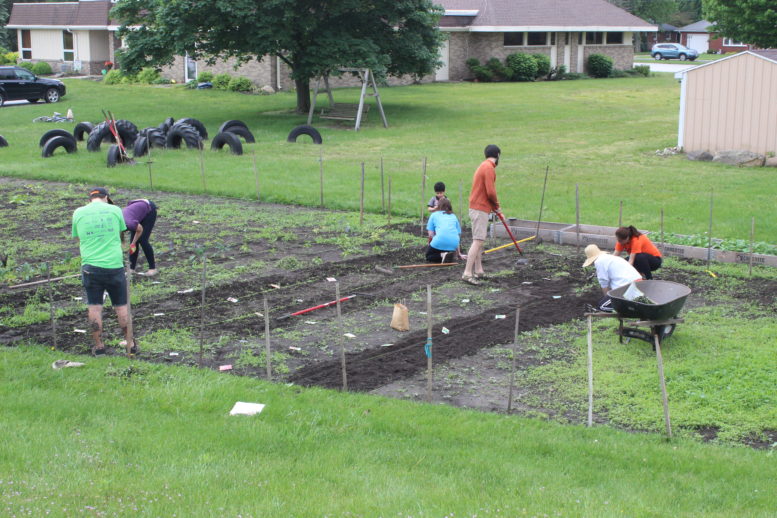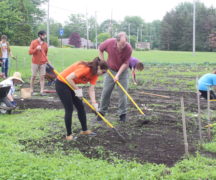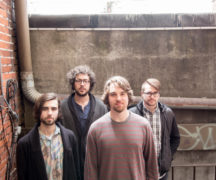By DAVID DUPONT
BG Independent News
American agri-business brags that it feeds the world. That doesn’t necessarily mean that food industry does a good job feeding its neighbors.
Agriculture is Ohio’s number one industry. Ohio also ranks seventh in food insecurity, said Carrie Hamady, from the School of Health and Human Services at Bowling Green State University
Hamady was moderating a panel of six local food activists brought together by BGSU’s Institute for the Study of Culture and Society at to discuss “Sustainability, Sustenance, and Stewardship” at the Wood County District Public Library.
The activists from Toledo and Bowling Green covered a broad range of issues, related to food, health, and community development.
“The end goal is to get healthy food into people’s hands,” said Sean Nestor, who is organizing the Urban Agriculture Alliance in Toledo.
Toledo GROWS is one of the urban agriculture pioneers in Toledo. For 23 years they’ve assisted grass roots efforts to develop community gardens, said Yvonne Dubielak.
Their seeds and seedlings have helped spawn 130 community gardens.
One of the beneficiaries of Toledo GROWS has been Elizabeth Harris, of Glass City Goat Gals.
Once when Attorney General Mike Dewine was campaigning, he asked Harris what was needed in her neighborhood.
“Goats,” she told him.
Goats can survive in city lots. They keep down the weeds, provide milk, and meat, which can be sold to provide cash.
Harris’ project, which includes a community garden as well as the goats, has helped turn around her neighborhood, once known as “murder alley,” into a good place to live.
These gardens, she said, can help provide nutritious vegetables that are otherwise not available in a central city neighborhood.
Harris said, she remembers going into a corner store, and basically all she could find were chips. The few fruits and vegetables are wilted and unappetizing.
This lack of grocery options in the city led ProMedica to finance a grocery store in its neighborhood, said Kate Sommerfeld. The shop benefits the hospital’s patients, who now sometimes receive food prescriptions, as well as its employees and nearby residents.
The hospital’s concern about food, Sommerfeld said, stems from the realization that many of the health problems its patients face are not medical, but social, including food insecurity. Doctors now screen patients for hunger.
Lack of proper food, Harris said, results in people lacking energy and mental acuity. She has seen one woman lose 40 pounds through her involvement with the community garden.
Working in the garden provide people with job skills, and “gives them ownership in their community,” Harris said.
Neiko Alvarado, a senior at BGSU who has worked as a former community gardening intern, said he’d like to use community gardens to teach people where their food comes from and how to grow food sustainably.
This can lead to educating people about nutrient overload from large scale agriculture that’s polluting Lake Erie, he said.
Growing the food and giving it to people is not enough, said Megan Sutherland, of Common Good in Bowling Green. It does little good if someone gets a kohlrabi “and they have no clue how to cook it especially when people don’t know how to prepare something from scratch.” Or they don’t have adequate kitchens.
Common Good has been coordinating the large community garden on West Wooster Street on the grounds of Peace Lutheran Church. It has also assisted with other community gardens around town.
The garden plans to work with the Brown Bag Food Project in town to not only provide food but to show people how to prepare it. Sutherland said more attention will be paid to growing crops people are more interested in consuming.
Dubielak said bringing people to eat together helps introduce these new foods, and build community.
Nestor said the Urban Agriculture Alliance will focus on the regulatory side of urban gardening.
Toledo city government has mixed policies. It’s difficult to get approval for greenhouses. One local resident was told he couldn’t set up a stand to sell produce from his garden because it was a commercial venture in a residential neighborhood.
Another man who was trying to revitalize a lot by using wood chips was told to stop because the chips were considered debris.
This kind of regulatory hurdles need to be removed, Nestor said.
Growing food locally may become even more of a necessity, Dubielak said.
She noted the natural disasters linked to climate change in California. There may come a time when people in Ohio won’t be able to depend on California to provide it sustenance. Urban agriculture and living off the land, she said, will provide the food security they need.



